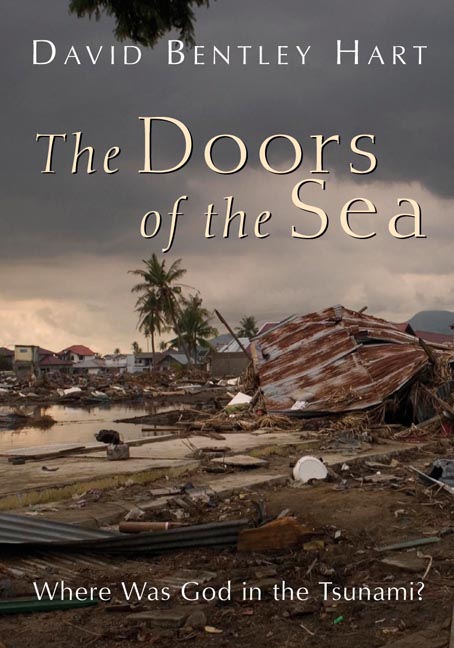
The Doors of the Sea: Where Was God in the Tsunami? (David Bentley Hart. Eerdmans. 2005) came to my attention at last week’s national staff meetings for InterVarsity Graduate & Faculty Ministries.* I’ve found the reflections of the Eastern Orthodox scholar and First Things contributor a timely Lenten follow-up not only to After Shock: Searching for Honest Faith When Your World Is Shaken (Kent Annan. IVP. 2011), but also an extended discussion of How Could A Good God Allow Suffering (Chapter 2 of Tim Keller’s The Reason for God: Belief in An Age of Skepticism. Dutton/Penguin. 2008).
Below’s an excerpt of The Doors of the Sea, posted by Eerdmans:
I said at the beginning of this book that silence might have been the wisest response in the days following the Indian Ocean catastrophe. And here, after (at this writing) two months and many thousands of words, I remain uncertain whether what I have said is proper or even remotely adequate. These rather desultory reflections were occasioned by what happened on that day, but I have clearly ventured far from any direct discussion of the sufferings of those who fell victim to that horrendous paroxysm of nature at her most murderous; and I do not know if I ought to have done so. This has not, obviously, been a book of apologetics, in large part because I still find myself less perturbed by the sanctimonious condescension of many of those who do not believe than by either the gelid dispassion or the shapeless sentimentality of certain of those who do. Neither has it been a book of “technical” or “philosophical” theology, though I have at points touched upon “technical” elements of Christian philosophical tradition (too lightly, I fear, to be entirely convincing and too heavily to be entirely lucid). Much less has it been a book of consolations. Rather, my principal aim has simply been to elucidate —as far as in me lies —what I understand to be the true scriptural account of God’s goodness, the shape of redemption, the nature of evil, and the conditions of a fallen world, not to convince anyone of its credibility, but simply to show where many of the arguments of Christianity’s antagonists and champions alike fail to address what is most essential to the gospel.
Clearly, also, I have expended at least as much energy contending against what I take to be defective formulations of Christian faith as I have against skeptical assaults upon that faith, but this is because, generally speaking, the latter have so little relevance to the object of their hostility that they pose no very formidable menace. … — http://www.eerdmans.com/shop/product.asp?p_key=9780802866868&i=3 and http://www.eerdmans.com/pdf/9780802866868_The%20Doors%20of%20the%20Sea_excerpt.pdf (3/31/2011).
The above quote only scratches the surface. More to come, but this is enough for today. I’ll close by encouraging you as we journey through Lent
- to develop deeper habits/practices of praying for, speaking on behalf of, and coming alongside those who are suffering around the world, in your neighborhood, in your family/home, and on campus. Ask for grace in discerning what this looks like when woven into the challenging schedule of your daily life.
- to share your reflections on the above quote.
- to read Hart’s essay Tsunami and Theodicy (First Things. 1/15/2010. A repost of Hart’s 3/2005 essay in response to the 2010 Haiti earthquake) and share it with friends (even a discussion group) who are wrestling with these questions.
PS. Anyone have a copy of Hart’s Atheist Delusions: The Christian Revolution and Its Fashionable Enemies (Yale U. Press. 2009). which I can borrow? Let me know.
*I.e., where George Marsden addressed Is Naturalism Losing Steam? Thank-you to Harry for his excellent book selections!
Tom enjoys daily conversations regarding living out the Biblical Story with his wife Theresa and their four girls, around the block, at Elizabethtown Brethren in Christ Church (where he teaches adult electives and co-leads a small group), among healthcare professionals as the Northeast Regional Director for the Christian Medical & Dental Associations (CMDA), and in higher ed as a volunteer with the Emerging Scholars Network (ESN). For a number of years, the Christian Medical Society / CMDA at Penn State College of Medicine was the hub of his ministry with CMDA. Note: Tom served with InterVarsity Christian Fellowship / USA for 20+ years, including 6+ years as the Associate Director of ESN. He has written for the ESN blog from its launch in August 2008. He has studied Biology (B.S.), Higher Education (M.A.), Spiritual Direction (Certificate), Spiritual Formation (M.A.R.), Ministry to Emerging Generations (D.Min.). To God be the glory!

Leave a Reply